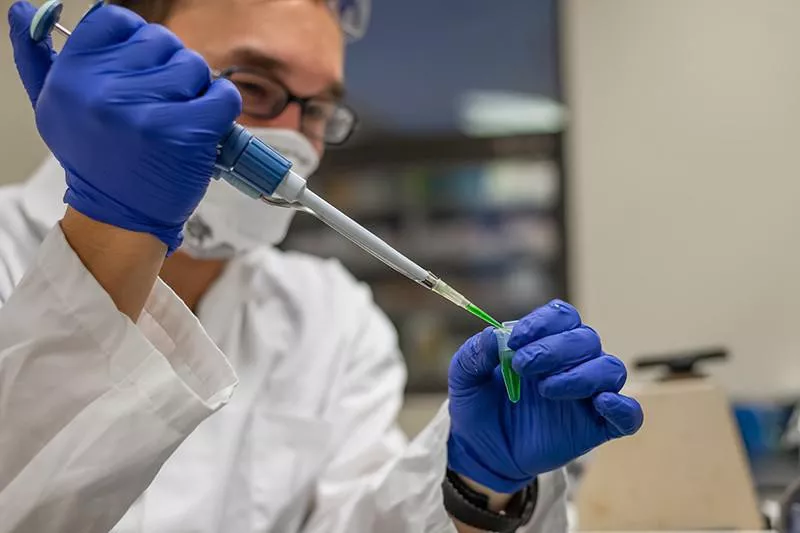Educators have been pushing careers in science, technology, engineering and math (STEM) for a long time. In 2001, Judith Ramaley, the assistant director of education and family resources at the National Science Foundation, coined the term STEM. And today, STEM presents unique work opportunities around the world.
But the job prospects look a lot different than they did in the past 10 or 20 years. New technologies and advances in our understanding of science concepts have opened doors to interesting and profitable careers that wouldn’t have been imagined a generation ago.
Now, STEM jobs are in high demand and pay well. While many jobs require only a bachelor’s degree, an advanced degree and/or certifications can make applicants more desirable (and more valuable). These are the highest-paying STEM careers.
Note: All figures are from the United States Bureau of Labor statistics. Median salaries are from 2018, the latest figure available, and the number of projected jobs are those expected by 2028.
52. Chemist

Getty Images
Median salary: $76,890
Projected jobs in the future: 90,900
Required degree: Bachelor’s
Best college major: Chemistry
Bottom line: Chemists study substances at the atomic and molecular level in order to develop and improve products and to test the quality of existing products.
They investigate the structure, properties, and composition of substances as well as the ways in which differing substances interact.
These professionals often specialize as analytical chemists, organic or inorganic chemists, forensic chemists, medicinal chemists, physical or theoretical chemists.
51. Agricultural Engineer

Getty Images
Median salary: $77,110
Projected jobs in the future: 2,800
Required degree: Bachelor’s
Best college major: Agricultural engineering, biological engineering
Bottom line: Agricultural engineers work in farming, forestry and food processing to solve agricultural problems. They address power supplies, environmental issues, the uses of structure and machinery, and the storage and processing of agricultural products.
In general, they search for ways to increase productivity, to make processes more efficient, and to reduce waste. Some work to integrate computers into agricultural processes by using artificial intelligence or geospatial systems to improve results.
Since a “typical” day can be spent either in the office or (sometimes literally) the field, this is a good option for those who enjoy talking through problems with others and would rather not be confined to a desk.
49. Genetic Counselor
Median salary: $80,370
Projected jobs in the future: 3,800
Required degree: Master’s
Best college major: Genetic counseling, genetics
Bottom line: Genetic counselors study genetics to identify specific genetic disorders through the study of genes and predict the likelihood a patient will develop a disease or whether potential children will inherit hereditary conditions or disorders.
Most choose to specialize in one area such as prenatal, pediatric or cancer and may further specialize in certain fields such as cardiovascular health, neurogenetics, genomic medicine, or psychiatry.
Since technological innovations continue to make genetic research more accessible and reliable, the demand for these professionals is expected to grow faster than many other fields.
48. Geographer
Median salary: $80,300
Projected jobs in the future: 1,600
Required degree: Bachelor’s
Best college major: Geography
Bottom line: Geographers study the Earth, its features and the effects caused by its occupants. Knowledge of the latest technology is important and certification in geographic information systems (GIS) is helpful.
Some geographers, known as human geographers, study the relationship between human activity and the environment. This may involve economic, environmental, medical, cultural, social or political data and may also involve statistical analysis.
Geographers are inquisitive and flexible. A sense of curiosity and willingness to travel and have new experiences are useful attributes for this career.
46. Management Analyst

Getty Images
Median salary: $83,610
Projected jobs in the future: 994,600
Required degree: Bachelor’s
Best college major: Business, economics, accounting, psychology, computer science, information science
Bottom line: Management analysts advise managers on how to reduce costs and increase revenues with the goal of making businesses and organizations more profitable.
They gather information and analyze data to develop solutions and recommend new systems, then work with managers to evaluate the effectiveness of these changes.
Some analysts are part of an organization’s staff, but many work on a contract basis, sometimes in conjunction with other analysts, each of whom may specialize in a specific area.
45. Computer Programmer
Median salary: $84,280
Projected jobs in the future: 232,400 (declining)
Required degree: Bachelor’s
Best college major: Computer science
Bottom line: Computer programmers write and test computer code for applications and computer software programs.
These professionals work with software developers and engineers to turn their ideas into instructions that tell a computer what to do. They also test new applications and programs to make sure the desired results occur. When mistakes happen, they need to check and fix the code.
While programmers work in multiple industries, those who work for software publishers earn considerably more.
44. Financial Analyst

Getty Images
Median salary: $84,300
Projected jobs in the future: 32,300 by 2026
Required degree: Bachelor’s
Best college major: Math, statistics, economics, accounting, finance
Bottom line: Financial analysts assess the performance of investments such as stocks and bonds in order to make recommendations to businesses and individuals.
Most analysts focus on a specific industry, geographical area or product type. They often work for banks, financial firms or insurance companies as portfolio managers, fund managers, ratings analysts or risk analysts.
43. Civil Engineer

Getty Images
Median salary: $86,640
Projected jobs in the future: 347,300
Required degree: Bachelor’s
Best college major: Civil engineering, civil engineering technology
Bottom line: Civil engineers design and build infrastructure. They are responsible for creating bridges, roads, tunnels, airports, buildings and water supply/sewage systems.
They may work in planning, construction, design, research or education and are responsible for presenting information to the public, such as property descriptions and environmental impact.
They may specialize in one or more areas as construction engineers, geotechnical engineers, structural engineers or transportation engineers.
42. Industrial Engineer
Median salary: $87,040
Projected jobs in the future: 308,400
Required degree: Bachelor’s
Best college major: Industrial engineering
Bottom line: Industrial engineers work to find efficient ways to integrate workers, materials, machines, information and energy in the production process, with minimal waste.
They need to balance factors such as time, resources, available technology, environmental concerns and safety as well as cost.
Manufacturing engineers specialize in automated processes and work to optimize computer networks, robots and materials.
41. Mechanical Engineer

Getty Images
Median salary: $87,370
Projected jobs in the future: 325,700
Required degree: Bachelor’s
Best college major: Mechanical engineering, mechanical engineering technology
Bottom line: Mechanical engineers design, build and test mechanical systems. They not only design machines, but they also design the machines needed to make machines.
Possibly the broadest engineering field, these professionals design and oversee the manufacture of countless products, from new batteries to power-producing and manufacturing machines and systems.
While fInding open mechanical engineering jobs will likely not be difficult, choosing among available industries may be.
40. Environmental Engineer

Getty Images
Median salary: $87,620
Projected jobs in the future: 58,300
Required degree: Bachelor’s
Best college major: Environmental engineering
Bottom line: Environmental engineers work to solve problems that impact the environment. They use engineering, soil science, biology and chemistry to improve waste disposal and public health and to reduce water and air pollution.
They also work on global issues such as climate change and environmental sustainability. Unlike some other engineering professions, environmental engineers have many opportunities to work outside.
A newer branch of engineering, the field is expected to grow.
39. Statistician
Median salary: $87,780
Projected jobs in the future: 58,000
Required degree: Masters
Best college major: Statistics, mathematics, economics, computer science
Bottom line: Statisticians analyze statistical data they have collected through questionnaires, surveys, experiments and opinion polls.
In most cases, a sampling method is used: They use a portion of a population and extrapolate that data proportionately. They also conduct tests to evaluate the validity of data and to account for nonresponse rates and sampling errors.
These professionals use specialized statistical software and may provide feedback to create new data-analyzing software.
37. Computer Systems Analyst

Getty Images
Median salary: $88,740
Projected jobs in the future: 689,900
Required degree: Bachelor’s
Best college major: Computer science, information science
Bottom line: Computer systems analysts analyze technology, in combination with a company or organization’s goals, to recommend ways to improve strategies. They often specialize in computer systems specific to an industry, such as financial or engineering.
In some cases, they specialize even further: Quality assurance analysts test and diagnose problems in their systems. Programmer analysts focus more on coding to design and update system software according to needs.
36. Database Administrator

Getty Images
Median salary: $90,070
Projected jobs in the future: 127,400
Required degree: Bachelor’s
Best college major: Computer science, information science
Bottom line: Database administrators are responsible for the storage, organization and security of information in a company’s database.
They work to ensure that data analysts and other users can easily access the information they need and that these systems operate properly. Since many databases include sensitive information, they also must implement security measures to keep unauthorized users out of the system.
These professionals act as gatekeepers and may need to be skilled in a number of computer languages and on various computer systems.
35. Geoscientist
Median salary: $91,130
Projected jobs in the future: 32,800
Required degree: Bachelor’s
Best college major: Geosciences, environmental science, engineering
Bottom line: Geoscientists study the physical nature of the Earth, its composition, structure and processes. They may use tools to extract samples for examination or use remote sensing devices to collect data.
Many specialize and may work to seek out and develop natural resources, to protect and preserve the environment, or to study natural phenomena. Some specialties include geologists, geochemists, geophysicists, oceanographers, paleontologists, petroleum geologists and seismologists.
With the large variety of specialties and environmental concerns, the demand for these professionals is expected to increase, especially as they are called in to consult on projects that impact the Earth.
33. Marine Engineer and Naval Architect

Getty Images
Median salary: $92,560
Projected jobs in the future: 12,700
Required degree: Bachelor’s
Best college major: Marine engineering, naval architecture, mechanical engineering, electrical engineering
Bottom line: Marine engineers and naval architects design, build and maintain ships.
Naval architects are responsible for the ship’s structure while marine engineers are responsible for a ship’s internal workings, such as the propulsion, electrical, steering and refrigeration systems. Marine engineers also may design and maintain offshore oil rigs and/or wind turbines.
An increased demand for alternative energy sources, paired with the technological advances that make it more financially feasible point toward an increase in projected employment for professionals working with offshore wind turbines.
32. Biochemist/Biophysicist

Getty Images
Median salary: $93,280
Projected jobs in the future: 32,300
Required degree: Doctoral or professional
Best college major: Biochemistry
Bottom line: Biochemists and biophysicists study the physical and chemical components of living things and biological processes to develop products and processes to improve people’s lives. Some examples are tests to detect infection, new drugs, improved agriculture production or alternative fuels.
Biochemists, also called molecular or cellular biologists, may study cells at a molecular level or trace the evolution of plants and animals and their genetic traits.
Biophysicists study nerve cells or proteins.
31. Veterinarian

Getty Images
Median salary: $92,830
Projected jobs in the future: 100,100
Required degree: Doctor of Veterinary Medicine
Best undergraduate degree: Biology
Bottom Line: Veterinarians provide health care for domestic animals, including pets and livestock, as well as captive animals in zoos and other places. They diagnose, treat and research medical conditions using methods and equipment similar to that used by human doctors.
These professionals advise on proper care and provide routine exams and care. They may specialize in large or small animals or in caring for companion animals or those raised as livestock. Some may specialize further in areas such as neurology or cardiology.
The demand for veterinarians is expected to increase, largely due to increases in pet ownership and spending on pet products.
30. Atmospheric Scientist and Meteorologist
Median salary: $94,110
Projected jobs in the future: 10,800
Required degree: Bachelor’s
Best college major: Meteorology
Bottom line: Atmospheric scientists study climate and the weather as well as how they relate to humans.
They may collect and compile data, develop forecasts, or advise clients on risks and opportunities related to weather and climate change. They may work in coordination with geoscientists or social scientists to solve problems in the areas of transportation, commerce, energy, agriculture and the environment.
Technological advances have improved forecasting accuracy, and more businesses are starting to employ their own forecasting teams to improve their shipping reliability and to keep deliveries on schedule. These professionals also help utility companies that deal with renewable power make decisions on when to buy and sell.
29. Information Security Analyst

Getty Images
Median salary: $98,350
Projected jobs in the future: 147,800
Required degree: Bachelor’s
Best college major: Computer science, programming, information assurance
Bottom line: Information security analysts work to protect a company’s computer networks and systems from cybersecurity threats such as hacking and identity theft.
They also work to create a disaster recovery plan, which will allow IT functions to continue in the event of a disaster. Additional certification may be needed for some positions.
The increased risk of cyberattacks means that the demand for these professionals is likely to rise faster than average. This is especially true in financial companies and industries that deal with sensitive personal information, such as health records.
28. Electrical/Electronics Engineer

Getty Images
Median salary: $99,070
Projected jobs in the future: 338,300
Required degree: Bachelor’s
Best college major: Electrical or electronics engineering
Bottom line: Electrical engineers design, develop and test electrical equipment.
They work to create or improve existing products or electrical systems that are part of a larger product.
In addition to consumer products, these professionals may work on federal systems such as satellites and radar and communications systems.
Related: Teacher Salaries by State
25. Mathematician
Median salary: $101,900
Projected jobs in the future: 3,600
Required degree: Master’s
Best college major: Mathematics
Bottom line: Mathematicians analyze the vast amounts of data stored online. They may work with other STEM professionals to solve problems using mathematical modeling.
These professionals often work in government, research and development, or education.
Those holding a Ph.D. are likely to work as college professors and/or in mathematical research.
24. Actuary

Getty Images
Median salary: $102,880
Projected jobs in the future: 30,000
Required degree: Bachelor’s
Best college major: Actuarial science, statistics
Bottom line: Actuaries use math, statistics and theory to analyze financial risks and uncertainties.
They often specialize in a particular field, such as property, life or health insurance. A series of exams are required to become a certified professional.
In some ways, actuaries are expected to be fortune-tellers, though they do so based on their analytical skills, honed through regular problem-solving and the rigorous studying required to pass certification exams.
23. Chemical Engineer

Getty Images
Median salary: $104,910
Projected jobs in the future: 36,000
Required degree: Bachelor’s
Best college major: Chemical engineering
Bottom line: Chemical engineers work to solve problems that involve the production or use of chemicals. They may specialize in particular chemical processes or in a specialized field such as nanomaterials or biological engineering.
In manufacturing, they design processes and equipment, plan and test production methods, and direct a facility’s operations. In these situations, they need to understand the impact on the environment and safety as it relates to both workers and consumers.
22. Software Developer

Getty Images
Median salary: $105,590
Projected jobs in the future: 1,649,600
Required degree: Bachelor’s
Best college major: Computer science, software engineering
Bottom line: Software developers create software applications. In doing so, they need to look at the users’ needs and identify the primary need the software must fulfill. In the event programs do not work as intended, they need to fix the problem and/or improve the program.
With the increasing number of devices containing computers and the increasing number of security threats, it is expected the need for these professionals will continue to expand faster than most other professions.
The continuing trend of providing downloadable software may also give rise to customizable software, which will add to the number of jobs available.
21. Nurse Practitioner

Getty Images
Median salary: $107,030
Projected jobs in the future: 189,100
Required degree: Master’s
Best college major: Nursing
Bottom line: Nurse practitioners may serve as primary care providers by assessing patients’ health and sharing information with patients about how to best integrate healthy practices and any necessary treatments.
They consult with other health practitioners when needed. Depending on the state in which they are licensed, NPs may prescribe medications and order lab tests.
With a projected shortage of physicians, NPs are becoming increasingly important as primary health providers.
19. Physician Assistant

Getty Images
Median salary: $108,610
Projected jobs in the future: 155,700
Required degree: Master’s
Best college major: Science, physician assistant graduate program
Bottom line: Physician assistants, commonly known as PAs, work with doctors to examine, diagnose and treat patients. While they perform many of the same roles as doctors, they are required to be supervised by a licensed physician.
All states require PAs to be licensed and to keep up to date with current advances to retain their license. Like nurse practitioners, PAs help to ensure patients receive needed care despite the projected shortage of physicians, particularly in more rural areas.
18. Computer Network Architect

Getty Images
Median salary: $109,020
Projected jobs in the future: 167,700
Required degree: Bachelor’s
Best college major: Computer science, engineering, information systems
Bottom line: Computer network architects custom design and build computer networks to match the specific needs of a company or organization.
In a sense, they act as a bridge between business and technology, so they need to be knowledgeable about computer systems and also be aware of commercial needs and trends. Additional certifications may also be necessary.
There is no way to foresee a company’s needs as technology and consumer demands change. A computer network architect needs to be able to keep up.
17. Computer Hardware Engineer

Getty Images
Median salary: $114,600
Projected jobs in the future: 68,400
Required degree: Bachelor’s
Best college major: Computer engineering
Bottom line: Computer hardware engineers research, design, develop and test the physical components that make up a computer, such as processors, circuit boards, routers and memory devices. They also work with software developers to update equipment to ensure that these components work with the latest software.
Since most computer innovation is at the software level, job growth for hardware engineers is expected to be about average over the next decade. The numbers, however, are not expected to shrink, as more manufacturers are integrating computers into everyday products, such as “smart” refrigerators.
16. Aerospace Engineer

Getty Images
Median salary: $115,220
Projected jobs in the future: 68,300
Required degree: Bachelor’s
Best college major: Aerospace engineering
Bottom line: Aerospace engineers design structures that are sent into the air — aircraft, spacecraft, satellites and missiles. As part of this process, they create and test prototypes to ensure they function as expected.
They are typically experts in one or more related areas: aerodynamics, thermodynamics, propulsion, acoustics, celestial mechanics, flight mechanics, and guidance and control systems.
They often specialize in either aeronautical (working with aircraft) or astronautical (working with spacecraft) engineering.
14. Certified Nurse Midwife

Getty Images
Median salary: $130,770
Projected jobs in the future: 7,600
Required degree: Master’s
Best college major: Nursing
Bottom line: Certified nurse midwives (CNMs) provide OB/GYN care. In addition to delivering babies, they perform routine exams and provide family planning services and prenatal care. They also may provide sexual or reproductive care for their patient’s partners.
CNMs make it possible for women to give birth outside a hospital setting, either at home or at free-standing birth centers. They may work in conjunction with OB/GYNs or in practices on their own. They generally have relationships with hospitals and doctors in the event more intervention is necessary.
Since most of their patients are “low-risk,” they are sometimes able to develop closer relationships with their patients.
13. Petroleum Engineer

Getty Images
Median salary: $137,170
Projected jobs in the future: 34,300
Required degree: Bachelor’s
Best college major: Petroleum engineering
Bottom line: Petroleum engineers are responsible for determining the best ways to extract oil and gas from underground rock formations, which sometimes means developing new methods.
They often specialize in a single aspect of the field, such as a drilling engineer, production engineer, completion engineer, or reservoir engineer.
12. Information Technology Manager

Getty Images
Median salary: $142,530
Projected jobs in the future: 461,100
Required degree: Bachelor’s
Best college major: Computer science, information science
Bottom line: Information technology (IT) managers oversee a business or organization’s technology usage. A company may have multiple levels, ranging from IT security managers to chief information officers, IT directors and chief technology officers.
While it may seem like everyone has been using computerized systems for years, there are still some companies migrating to digital platforms. These companies will need assistance in making the move and securing their data.
As many companies move to cloud computing, there may be a shift to outsourcing, rather than hiring IT professionals in house.
11. Dentist

Getty Images
Median salary: $151,850
Projected jobs in the future: 147,400
Required degree: Doctor of dental surgery or doctor of medicine in dentistry
Best college major: Biology, chemistry
Bottom line: Dentists care for patients’ teeth, gums and related mouth areas. They provide education and advice on oral health care and recommendations on diet choices that may have an impact.
They fill cavities, repair or remove damaged teeth, provide preventive services such as sealants, administer anesthetics and prescribe antibiotics when needed.
10. Computer and Information Systems Manager

Getty Images
Median salary: $142,530
Projected jobs in the future: 461,100
Required degree: Bachelor’s
Best college major: Computer science, information science
Bottom line: Computer and information system managers, also called information technology (IT) managers or IT project managers, coordinate and plan a company’s computer-related activities.
They work to determine an organization’s IT goals and are responsible for implementing appropriate computer systems.
Large companies may have a number of professionals filling this role, such as a chief information officer (CIO), chief technology officer (CTO), as well as IT directors and security managers.
8. Pediatrician

Getty Images
Median salary: $183,240
Projected jobs in the future: 32,400
Required degree: Medical doctor (M.D.) or doctor of osteopathic medicine (D.O.)
Best undergraduate college major: Biology, chemistry, physics, math
Bottom line: Pediatricians provide health care for children, from infancy through adulthood.
They specialize in the health concerns of younger people, providing preventive care and immunizations as well as treating illnesses, injuries and infectious diseases.
Some pediatricians specialize in more serious conditions or pediatric surgery.
7. Oral and Maxillofacial Surgeon

Getty Images
Median salary: $208,000
Projected jobs in the future: 6,300
Required degree: Doctor of dental surgery or doctor of medicine in dentistry
Best undergraduate college major: Biology, chemistry
Bottom line: Oral and maxillofacial surgeons perform surgical procedures on the mouth, teeth, jaws, gums, neck and head.
This includes not only removing impacted teeth but also treating cysts or tumors, inserting dental implants and repairing misaligned jaws or a cleft palate.
Since this profession requires advanced surgical training, most take a specialized exam to earn certification.
5. Doctor (Family/General Practitioner)

Getty Images
Median salary: $211,780
Projected jobs in the future: 139,000
Required degree: Medical doctor (M.D.) or doctor of osteopathic medicine (D.O.)
Best undergraduate college major: Biology, chemistry, physics, math
Bottom line: Doctors provide preventive care, diagnose and treat illnesses and injuries, and counsel patients on healthy living habits.
They may treat individuals of all ages and typically have regular, long-term patients.
These professionals tend to deal mostly with everyday conditions and may refer more complex issues to specialists.
4. Psychiatrist

Getty Images
Median salary: $220,380
Projected jobs in the future: 33,200
Required degree: Medical doctor (M.D.) or doctor of osteopathic medicine (D.O.)
Best undergraduate college major: Biology, chemistry, physics, math
Bottom line: Psychiatrists are primary doctors for mental health. They diagnose and treat illness through psychotherapy (counseling), psychoanalysis, hospitalization and medication.
These professionals often help patients find solutions through changes in behavior patterns or through group and family therapy sessions. Treatments may involve long-term therapy and/or medication to correct chemical imbalances.
In recent years, there has been a growing need for psychiatric services, though access to services has declined, particularly in rural areas. This is due not only to a shortage of providers, but also to costs and insurance regulations.
3. Obstetrician/Gynecologist

Getty Images
Median salary: $238,320
Projected jobs in the future: 21,100
Required degree: Medical doctor (M.D.) or doctor of osteopathic medicine (D.O.)
Best undergraduate college major: Biology, chemistry, physics, math
Bottom line: Obstetricians and gynecologists provide health care related to pregnancy, childbirth and female reproductive care.
Obstetricians counsel and treat patients throughout pregnancy and assist in delivering babies, naturally or via cesarean section. Gynecologists provide preventive care, diagnose and treat health issues specific to women and their reproductive systems.
Despite a shrinking birthrate, demand for these specialists is high. In fact, the American Congress of Obstetricians and Gynecologists predicts a shortage of up to 22,000 OB/GYNs by 2050.
2. Surgeon

Getty Images
Median salary: $255,110
Projected jobs in the future: 38,700
Required degree: Medical doctor (M.D.) or doctor of osteopathic medicine (D.O.)
Best undergraduate college major: Biology, chemistry, physics, math
Bottom line: Surgeons treat injuries, diseases and other health issues through surgery.
Though some perform general surgery, many choose to specialize in a certain area such as orthopedics, neurology, cardiovascular or reconstructive surgery.
Like other doctors, surgeons also perform examinations, perform and interpret tests, and counsel patients on preventive care.
1. Anesthesiologist

Getty Images
Median salary: $267,020
Projected jobs in the future: 36,000
Required degree: Medical doctor (M.D.) or doctor of osteopathic medicine (D.O.)
Best college major: Biology, chemistry, physics, math
Bottom line: Anesthesiologists focus on relieving pain for patients. During surgery or other medical procedures, they administer anesthetics and monitor a patient’s vital signs.
Outside of surgery, they provide pain relief for patients in a hospital setting, for those in the Intensive Care Unit, for women in labor, and those with chronic pain.
While patients don’t generally get to choose their anesthesiologist, these doctors participate in 90 percent of all surgical procedures and are crucial to patients’ well-being, ensuring that they are pain-free and unconscious (if required) throughout the surgery.
Related: Dying Professions You Should Avoid